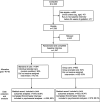Group prenatal care and perinatal outcomes: a randomized controlled trial
- PMID: 17666608
- PMCID: PMC2276878
- DOI: 10.1097/01.AOG.0000275284.24298.23
Group prenatal care and perinatal outcomes: a randomized controlled trial
Erratum in
- Obstet Gynecol. 2007 Oct;110(4):937
Abstract
Objective: To determine whether group prenatal care improves pregnancy outcomes, psychosocial function, and patient satisfaction and to examine potential cost differences.
Methods: A multisite randomized controlled trial was conducted at two university-affiliated hospital prenatal clinics. Pregnant women aged 14-25 years (n=1,047) were randomly assigned to either standard or group care. Women with medical conditions requiring individualized care were excluded from randomization. Group participants received care in a group setting with women having the same expected delivery month. Timing and content of visits followed obstetric guidelines from week 18 through delivery. Each 2-hour prenatal care session included physical assessment, education and skills building, and support through facilitated group discussion. Structured interviews were conducted at study entry, during the third trimester, and postpartum.
Results: Mean age of participants was 20.4 years; 80% were African American. Using intent-to-treat analyses, women assigned to group care were significantly less likely to have preterm births compared with those in standard care: 9.8% compared with 13.8%, with no differences in age, parity, education, or income between study conditions. This is equivalent to a risk reduction of 33% (odds ratio 0.67, 95% confidence interval 0.44-0.99, P=.045), or 40 per 1,000 births. Effects were strengthened for African-American women: 10.0% compared with 15.8% (odds ratio 0.59, 95% confidence interval 0.38-0.92, P=.02). Women in group sessions were less likely to have suboptimal prenatal care (P<.01), had significantly better prenatal knowledge (P<.001), felt more ready for labor and delivery (P<.001), and had greater satisfaction with care (P<.001). Breastfeeding initiation was higher in group care: 66.5% compared with 54.6%, P<.001. There were no differences in birth weight nor in costs associated with prenatal care or delivery.
Conclusion: Group prenatal care resulted in equal or improved perinatal outcomes at no added cost.
Clinical trial registration: ClinicalTrials.gov, www.clinicaltrials.gov, NCT00271960
Level of evidence: I.
Figures



Comment in
-
Group prenatal care and perinatal outcomes: a randomized controlled trial.Obstet Gynecol. 2008 Apr;111(4):993, author reply 993-4. doi: 10.1097/AOG.0b013e31816bf4be. Obstet Gynecol. 2008. PMID: 18378763 No abstract available.
References
-
- Hofman PL, Regan F, Jackson WE, Jefferies C, Knight DB, Robinson EM, et al. Premature birth and later insulin resistance. N Engl J Med. 2004;351:2179–86. - PubMed
-
- Foulder-Hughes LA, Cooke RW. Motor, cognitive, and behavioural disorders in children born very preterm. Dev Med Child Neurol. 2003;45:97–103. - PubMed
-
- Hobel CJ, Ross MG, Bemis RL, Bragonier JR, Nessim S, Sandhu M, et al. The West Los Angeles Preterm Birth Prevention Project. I. Program impact on high-risk women. Am J Obstet Gynecol. 1994;170:54–62. - PubMed
Publication types
MeSH terms
Associated data
Grants and funding
LinkOut - more resources
Full Text Sources
Medical
Research Materials

